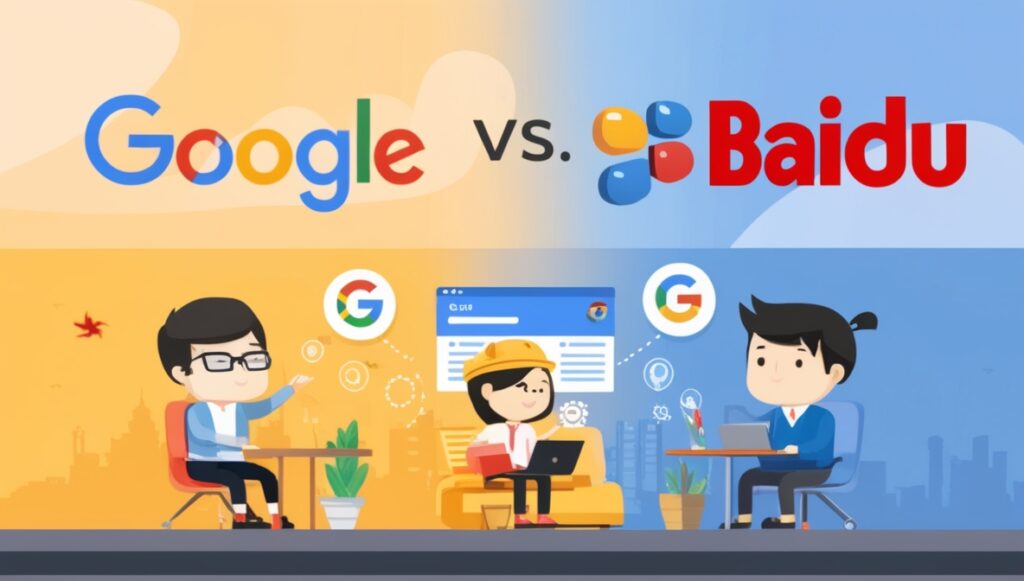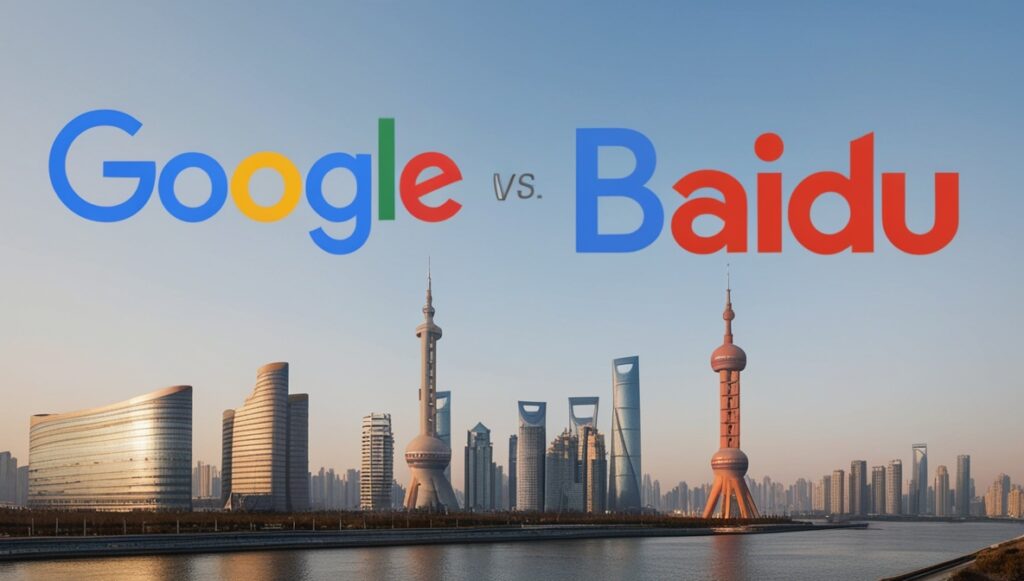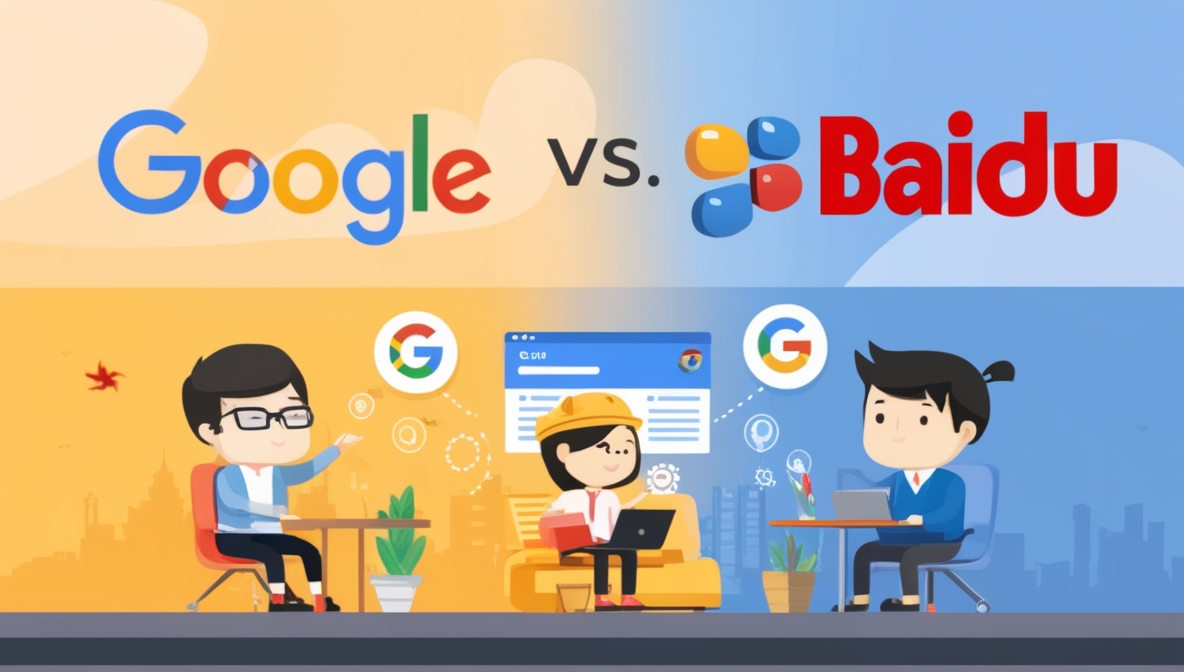
In the world of search engine optimization (SEO), Google is the dominant force globally, while Baidu reigns supreme in China. For businesses seeking to tap into the vast Chinese market, understanding the key differences between Baidu and Google SEO is crucial for developing a winning strategy. Although both platforms share similar fundamental SEO principles, the nuances in their algorithms, user behavior, and market conditions make optimizing for Baidu a distinct challenge. In this article, we’ll explore the differences between Baidu and Google SEO and how you can leverage them to create an effective SEO strategy for the Chinese market.
Understanding the Baidu vs. Google Landscape

Google holds the lion’s share of global search engine traffic, dominating with over 90% market share outside of China. Baidu, on the other hand, controls over 70% of the search engine market in China. Google’s departure from the Chinese mainland due to censorship issues paved the way for Baidu to solidify its leadership. Thus, if you are targeting Chinese users, understanding Baidu’s SEO practices becomes essential.
1. Language and Localization
The most significant difference between Google and Baidu SEO lies in language. Baidu focuses heavily on Chinese-language content, particularly Simplified Chinese. While Google’s algorithms are adept at handling multilingual SEO, Baidu prioritizes content in Chinese. Therefore, if you want to rank on Baidu, translating and localizing your website content is not enough. You must ensure your content resonates with the cultural and linguistic nuances of the Chinese audience. Additionally, Baidu tends to favor domains that use Chinese top-level domains (e.g., .cn) and host their sites in China, which significantly enhances page load times due to the Great Firewall.
2. Content Censorship
Unlike Google, Baidu is subject to strict Chinese government censorship. Content related to politically sensitive issues or topics banned by the Chinese government will not rank on Baidu, and can even result in penalties. Therefore, businesses must be vigilant about adhering to local laws and regulations to avoid penalization. Baidu’s algorithm also censors search results, meaning certain content or search queries might not be displayed at all, depending on local government guidelines.
3. Mobile-First Approach
While Google has also adopted a mobile-first indexing approach, Baidu’s reliance on mobile SEO is even more pronounced. Mobile internet usage in China exceeds 99%, so optimizing your site for mobile users is non-negotiable. Sites that load slowly or perform poorly on mobile devices are heavily penalized on Baidu, with its Lightning Algorithm specifically designed to reward fast-loading pages.
Ensuring that your mobile site is fully optimized for speed, usability, and content richness is crucial when targeting Baidu’s mobile-first indexing model. Google follows similar mobile-first practices, but Baidu’s algorithm takes it a step further by integrating native mobile-friendly features such as faster indexing for pages optimized for Chinese mobile networks.
4. Backlinks and Trustworthiness
Both Google and Baidu consider backlinks an important factor in ranking, but the weight placed on these links differs. Baidu prefers backlinks from high-authority Chinese websites, especially those hosted within the country. The quality of backlinks is paramount, and spammy links or unnatural link-building tactics are heavily penalized. While Google also values quality over quantity when it comes to backlinks, it allows more flexibility in the source of backlinks as long as they are relevant and authoritative.
When building a backlink profile for Baidu SEO, ensure that your backlinks come from trusted Chinese websites, ideally with .cn domains and ICP licenses (the license required for websites to be hosted in China).
5. Meta Keywords and Other On-Page Factors
One of the key differences between Google and Baidu SEO lies in the continued importance of meta keywords for Baidu rankings. While Google has long moved away from relying on meta keywords due to widespread abuse, Baidu still places significant weight on them. Therefore, optimizing your meta keywords with relevant search terms can give your site a ranking boost on Baidu. On the other hand, Google prioritizes user intent, meaning content relevancy and semantic search queries are more important than specific keyword matching.
Moreover, Baidu places a heavy emphasis on meta descriptions, title tags, and other on-page factors like the presence of alt text for images. For businesses targeting Baidu, these on-page optimizations are critical for achieving higher visibility.
6. User Experience and Website Design
User experience (UX) is a crucial ranking factor for both Baidu and Google, but how each search engine evaluates UX differs. While Google emphasizes aspects like website design, load time, and mobile responsiveness, Baidu also considers how well a site is tailored to Chinese user behaviors. For example, research has shown that Chinese users tend to scan search result pages differently, spending more time on each listing and scanning more listings per page compared to Western users. Therefore, having a user-friendly layout and intuitive navigation is even more critical for Baidu SEO success.
Baidu also heavily penalizes websites that use aggressive pop-ups or interstitials, similar to Google’s intrusive interstitial penalty.
7. Baidu’s Focus on Local SEO
While local SEO is important for both Baidu and Google, Baidu offers additional tools specifically designed for local businesses. Baidu integrates local listings through its products, such as Baidu Maps and Baidu Zhidao (Q&A). Adding location tags and optimizing your site for local Chinese searches can improve visibility and ranking on Baidu, especially for businesses with a physical presence in China. Google offers similar local SEO services through Google My Business, but Baidu’s localization efforts are more geared toward the unique requirements of Chinese users.
8. Rich Snippets and Schema Markup
Google is known for its rich snippets and structured data that allow enhanced search result displays. Baidu has a similar feature but it is more selective in offering rich snippets, often limiting them to larger and more established sites. While Baidu doesn’t use schema markup like Google, it does provide opportunities for rich search results, such as images or review ratings, which can boost click-through rates.
Conclusion: Tailoring SEO Strategies for Baidu

Both Google and Baidu share many SEO principles, but their differences reflect the unique search behavior, government regulations, and market characteristics of China. Businesses looking to optimize their digital presence in China must prioritize localized content, comply with censorship laws, and focus on mobile optimization and local SEO strategies. Baidu’s algorithms are still evolving and becoming more sophisticated, but understanding the distinct nuances between the two search engines can lead to greater success in the competitive Chinese digital market.
By tailoring your SEO strategy to meet Baidu’s guidelines while leveraging successful Google SEO practices, you can position your business for success in China’s rapidly growing online ecosystem.

